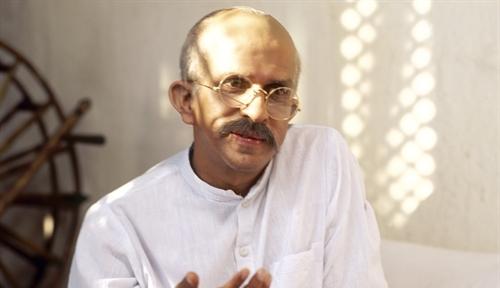Mohandas “Mahatma” Gandhi was India’s most important political and spiritual leader. He is honoured in India as Father of the Nation. His non-violent protests led to independence for India from the British. His beliefs and actions have inspired civil rights movements across the globe. He is an icon of world peace. His birthday, 2nd October, is commemorated worldwide as the International Day of Non-Violence.
莫罕達斯·卡拉姆昌德·甘地曾是印度舉足輕重的政治和靈魂領袖。印度尊稱他為“國父”。通過“非暴力”抵抗運動,甘地使印度擺脫英國統治。他的信仰和行動也帶動了全球人權運動發展。甘地代表了世界和平。為了紀念甘地,將每年的10月2日定為國際非暴力日,這天也是甘地誕辰。
Gandhi was born in Gujarat, Western India, in 1869. He grew up surrounded by religious traditions of compassion, vegetarianism, and tolerance for all people. He got married at the age of 13. When he was 19, he went to London to study law. He returned to India to practice as a lawyer but was hampered by British officials, so he accepted a job in South Africa.
1869年,甘地出生在西印度古吉拉特。他成長在一個虔誠仁愛、素食、寬容的家庭。甘地13歲結婚。19歲那年,前往倫敦學習法律。之后回到印度成為律師,但遭到英國官員阻撓,不得不在南非另謀它業。

In South Africa, Gandhi faced discrimination and hardship wherever he went. He was treated as a third-class citizen by white people. This awakened in him questions about social justice and the role of the British in India. He returned to India in 1915, ready to put to work the concept of passive resistance he developed in South Africa.
在南非,甘地無論走到哪里都受到歧視和侮辱。并被白人當作“三等公民”。這些驚醒了甘地,并對社會公正和英帝國主義產生了質疑。1915年,甘地回國,并將其在南非所發展的“消極抵抗”發揚光大。
Between 1916 and 1945, Gandhi campaigned tirelessly to set India free from British rule. He started by leading protests against British taxes and landlords, and walked across India encouraging non-cooperation with the British. He was arrested and imprisoned for creating unrest. Gandhi's fame spread all over the nation. He was assassinated in 1948. Two years later, India became an independent republic.
1916-1945年,為了使印度擺脫英國統治,甘地付出了決絕努力。起初,他領導英國稅法和地主反抗運動,并在全國宣講,發動不合作運動。因發動暴亂,甘地被捕入獄。甘地享譽全國。1984年,甘地遭刺殺。兩年后,印度共和國成立。
譯文屬可可英語原創,未經允許,不得轉載。











